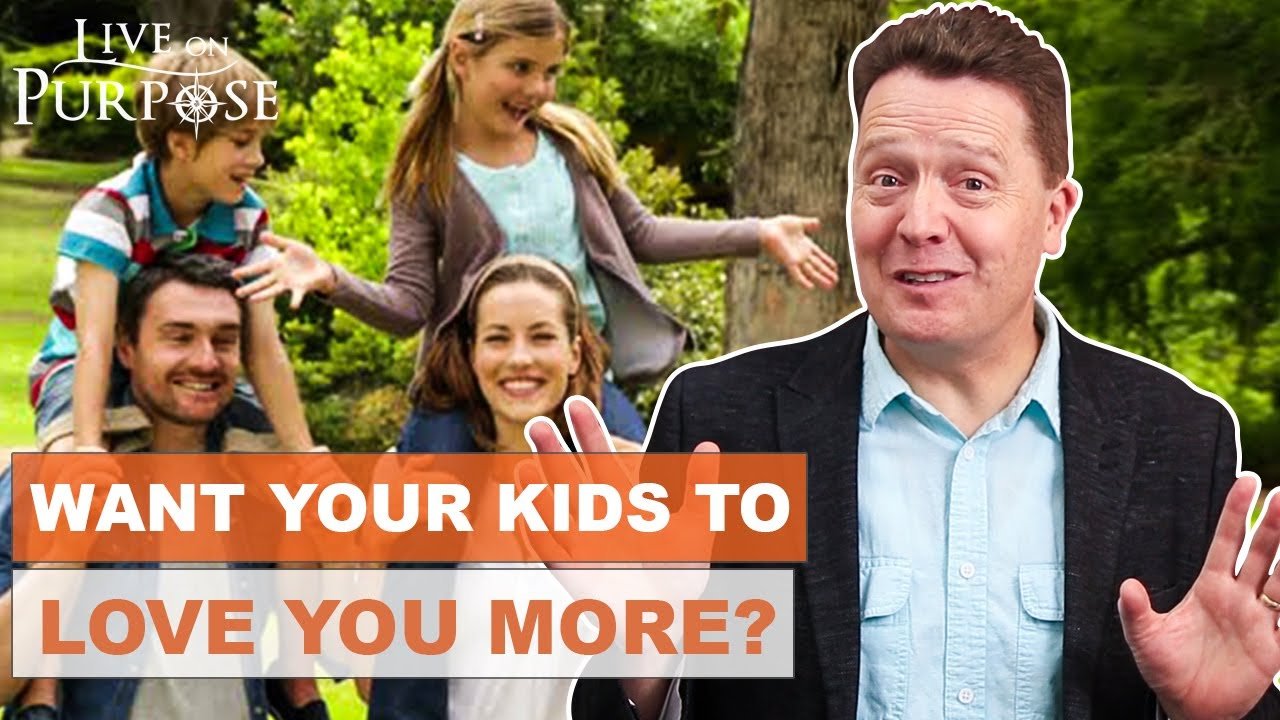Parenting can be tough sometimes, leading to frustration and the temptation to yell at our children. But there are effective strategies for positive parenting without resorting to yelling. In the video “Effective Strategies for Positive Parenting without Yelling” by Live On Purpose TV, Dr. Paul Jenkins discusses the stages of control and maturity in parenting and how they relate to our behavior as parents. Yelling is considered a stage one behavior and can be avoided by implementing consequences that do not require cooperation. The video also mentions the availability of the Parenting Power-Up course, which provides specific strategies for positive parenting without yelling. So, if you’re looking to be a better parent and stop yelling, this video is a valuable resource to help you on your journey.

Understanding the Importance of Positive Parenting
Parenting can often be challenging and frustrating, leading us to lose our patience and resort to yelling at our children. However, it is crucial to understand the impact of our actions on our children and strive to become better parents by cultivating control and maturity. By exploring the stages of control and maturity in parenting, we can gain a deeper understanding of how to create a nurturing and supportive environment for our children without resorting to yelling.
The Impact of Yelling on Children
Yelling at our children can have several negative effects on their emotional and psychological well-being. Research has shown that frequent exposure to yelling can lead to increased levels of stress, anxiety, and aggression in children. It can also damage their self-esteem and create a strained parent-child relationship. Understanding the harmful consequences of yelling is essential in motivating us to break the cycle and adopt alternative strategies.
The Benefits of Positive Parenting
Positive parenting offers numerous benefits for both parents and children. By adopting a positive approach, we can build a strong parent-child relationship based on trust, respect, and open communication. Positive parenting strategies promote improved communication skills, which allows for a better understanding of our children’s emotions and needs. Furthermore, positive parenting teaches emotional regulation and self-control, empowering children to manage their emotions effectively.
The Role of Control and Maturity in Effective Parenting
Control and maturity are key components of effective parenting. By understanding the correlation between control and maturity, we can enhance our parenting skills and provide a nurturing environment for our children. As parents, we need to recognize that control is not about exerting dominance over our children, but rather about guiding them through each stage of development. Cultivating maturity allows us to handle challenging situations with patience, empathy, and resilience.
Stage One Behavior: Understanding Yelling
Why Parents Resort to Yelling
Parents often resort to yelling when they feel overwhelmed, frustrated, or powerless in the face of their children’s behavior. Yelling may provide a temporary release of emotions, but it is an ineffective long-term solution. Understanding the underlying reasons for our tendency to yell can help us develop alternative strategies to manage our emotions and respond to our children’s behavior more effectively.
The Negative Effects of Yelling on Children
Yelling can have detrimental effects on children, causing them to feel fearful, anxious, and insecure. It can damage their self-esteem, hinder their emotional development, and create a hostile family environment. By acknowledging the negative impact of yelling, we can take crucial steps to break the cycle and create a healthier and more positive parenting dynamic.
Breaking the Cycle of Yelling
Breaking the cycle of yelling requires a shift in our mindset and the adoption of alternative strategies. It begins with self-reflection and self-awareness, where we recognize our triggers and emotions that lead to yelling. By identifying healthier coping mechanisms and seeking support through therapy or parenting courses, we can learn effective techniques to manage our emotions and respond to our children’s behavior in a calm and constructive manner.
Benefits of Strategies that Avoid Yelling
Building a Strong Parent-Child Relationship
Implementing strategies that avoid yelling allows us to build a strong, loving, and supportive parent-child relationship. By replacing yelling with effective communication, active listening, and empathy, we create an atmosphere of trust, understanding, and mutual respect. This foundation strengthens the bond between parent and child, fostering a harmonious and nurturing environment.
Improved Communication and Understanding
Strategies that avoid yelling promote improved communication and understanding between parents and children. By actively listening to our children, validating their emotions, and engaging in open and honest conversations, we create a safe space for them to express themselves. This exchange of thoughts and feelings enhances our understanding of their needs and helps us address any issues or conflicts in a constructive way.
Teaching Emotional Regulation and Self-Control
Positive parenting strategies teach children valuable skills such as emotional regulation and self-control. By modeling these behaviors ourselves and providing guidance during challenging moments, we empower our children to manage their emotions effectively. Teaching children how to identify and express their emotions in healthy ways allows them to navigate relationships and conflicts with greater ease.
Using Consequences as Effective Alternatives
Understanding the Concept of Consequences
Consequences are an essential aspect of positive parenting. Instead of resorting to yelling, we can utilize consequences to teach our children about responsibility and accountability. Consequences provide valuable lessons about the impact of our actions and choices, encouraging personal growth and self-reflection.
Implementing Consequences that Do Not Require Cooperation
When dealing with stage one behaviors, it is crucial to select consequences that do not require cooperation from our children. This recognition allows us to address the issue at hand without getting caught in a power struggle or becoming frustrated. Consequences such as loss of privileges, time-outs, or natural consequences can be effective in teaching children about the consequences of their behavior.
Teaching Responsibility Through Natural Consequences
Natural consequences provide valuable learning experiences for children. By allowing them to experience the natural outcome of their actions, we teach them responsibility and decision-making skills. Instead of imposing punishments, we guide them through the consequences, helping them understand the connection between their behavior and the outcome.
Positive Reinforcement and Encouragement
The Power of Positive Reinforcement
Positive reinforcement is a highly effective strategy in promoting positive behavior and providing encouragement to our children. By recognizing and praising their good behavior, we reinforce their sense of self-worth and create a healthy and supportive environment. Positive reinforcement focuses on acknowledging and rewarding desirable behavior, increasing the likelihood of its recurrence.
Identifying and Praising Good Behavior
To encourage positive behavior, it is essential to identify and praise specific actions or attitudes that align with our values and expectations. By providing specific feedback and acknowledging their efforts, we boost our children’s self-esteem and intrinsic motivation. Regularly reinforcing good behavior allows our children to develop a positive self-image and a strong sense of competence.
Encouraging Effort and Progress
In addition to praising good behavior, it is equally important to encourage effort and progress. A growth mindset emphasizes the value of effort and perseverance, rather than solely focusing on outcomes. By recognizing our children’s efforts, even in the face of challenges or setbacks, we foster their resilience and perseverance, nurturing their desire to learn and grow.
Effective Communication Strategies
Active Listening and Empathy
Effective communication with our children begins with active listening and empathy. By actively listening to their thoughts, feelings, and concerns, we demonstrate our genuine interest in their experiences. Empathy plays a crucial role in understanding their perspective and acknowledging their emotions, fostering a deeper connection and strengthening our parent-child relationship.
Setting Clear Expectations and Boundaries
Setting clear expectations and boundaries is essential for effective communication. By establishing consistent rules and guidelines, we provide our children with a sense of security and structure. Clear expectations help children understand what is acceptable behavior and promote a harmonious family environment.
Using Assertive and Respectful Language
When communicating with our children, it is vital to use assertive and respectful language. Using “I” statements helps us express our expectations and concerns without sounding accusatory or judgmental. By modeling assertive and respectful communication, we teach our children valuable skills in expressing themselves and resolving conflicts peacefully.
Promoting Emotional Intelligence in Children
Teaching Children to Identify and Express Emotions
Promoting emotional intelligence in children involves teaching them to identify and express their emotions in healthy ways. By providing them with a vocabulary to express their feelings, we empower them to communicate their needs effectively. Recognizing and validating their emotions helps children develop self-awareness and enhances their ability to navigate and manage their emotions.
Helping Children Cope with Overwhelming Emotions
Children may experience overwhelming emotions such as anger, frustration, or sadness. As parents, it is our role to provide support and guidance in helping them cope with these emotions. By teaching them mindfulness techniques, breathing exercises, or engaging in calming activities, we equip them with effective coping mechanisms to regulate their emotions.
Encouraging Problem-Solving and Decision-Making
Promoting emotional intelligence also involves encouraging problem-solving and decision-making skills in our children. By involving them in decision-making processes and encouraging them to generate solutions to conflicts or challenges, we foster their critical thinking skills and independence. This empowers them to make informed choices and develop a sense of autonomy and self-confidence.
Setting Realistic Expectations
Recognizing Age-Appropriate Behavior
Setting realistic expectations begins with recognizing age-appropriate behavior. Children go through different stages of development, each with its unique challenges and capabilities. By understanding where our children are developmentally, we can set realistic expectations that promote their growth and allow for age-appropriate exploration and learning.
Adjusting Expectations Based on Individual Differences
In addition to recognizing general age-appropriate behavior, it is crucial to consider individual differences among our children. Each child has their strengths, weaknesses, and unique personality traits. By tailoring our expectations to their individual needs and abilities, we create a supportive environment that nurtures their growth and promotes their self-esteem.
Fostering a Growth Mindset
Setting realistic expectations involves fostering a growth mindset in our children. By emphasizing the value of effort, perseverance, and learning from mistakes, we encourage them to embrace challenges and view setbacks as opportunities for growth. A growth mindset promotes resilience and a love for learning, enabling our children to reach their full potential.
Self-Care for Parents
Recognizing the Importance of Self-Care
As parents, it is crucial to recognize the importance of self-care. Taking care of our own well-being allows us to be more present and emotionally available for our children. Prioritizing self-care helps us manage stress, maintain a positive mindset, and enhance our overall happiness and fulfillment.
Managing Stress and Avoiding Burnout
Parenting can be stressful, and it is essential to develop strategies to manage stress and prevent burnout. Self-care activities such as exercise, meditation, engaging in hobbies, or seeking social support help us recharge and maintain a healthy work-life balance. Additionally, establishing a support system, whether through family, friends, or parenting groups, provides emotional support and valuable resources.
Seeking Support and Resources
Seeking support and resources is a proactive way to enhance our parenting skills and promote self-care. Parenting courses, therapy, or online communities offer valuable guidance, knowledge, and a sense of community. Surrounding ourselves with like-minded individuals and seeking professional help when needed empowers us to become better parents and create a nurturing environment for our children.
Conclusion
In conclusion, understanding the importance of positive parenting without resorting to yelling is essential for nurturing a healthy and supportive family dynamic. By recognizing the impact of our actions and adopting alternative strategies, we can build strong relationships with our children, improve communication, and teach them valuable life skills. Continuous learning, self-reflection, and prioritizing self-care empower us to create an environment filled with love, respect, and emotional well-being. By embracing positive parenting, we can truly make a difference in our children’s lives and empower them to reach their full potential.

